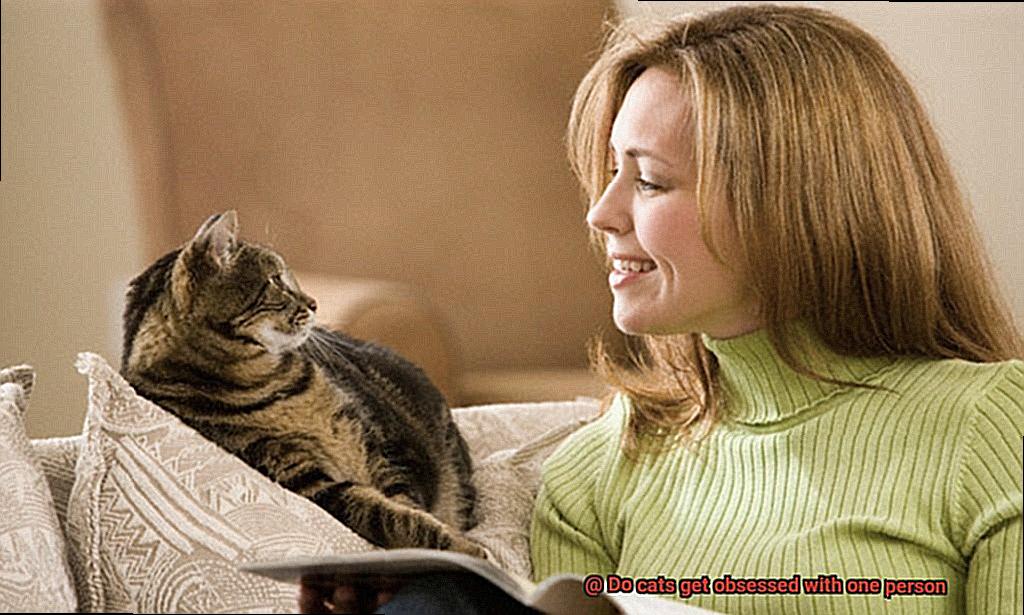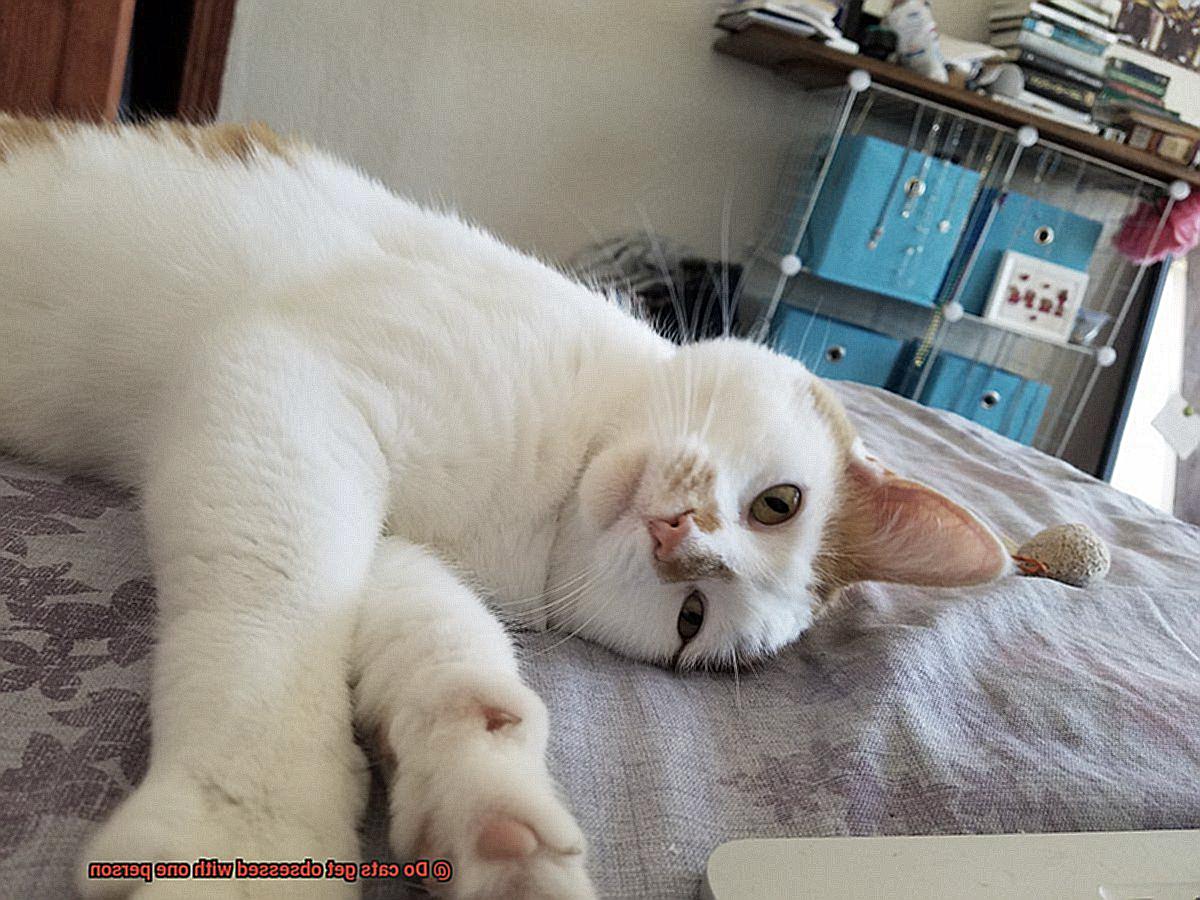As a cat enthusiast, you may have observed your feline friend’s clingy behavior and wondered if they’re obsessed with you. After all, cats are known for their independent nature and love for personal space. However, it’s not uncommon for them to develop a strong attachment to their owners and display affection that can be interpreted as obsession.
But is this trait common among all cats or specific breeds? According to research, cats have unique personalities like humans, and some breeds are genetically predisposed to forming stronger bonds with their humans. Additionally, the way you treat your cat plays a significant role in determining how attached they become to you.
In this blog post, we’ll delve into the science behind feline obsession with humans and explore the telltale signs that suggest your cat might be too “into” you. We’ll also debunk some myths surrounding cats’ aloofness and lack of affection. Whether you’re a dedicated cat lover looking to deepen your bond with your furry buddy or considering getting a cat, this post will provide valuable insights into fostering a healthy relationship with your feline companion.
So buckle up and get ready to learn more about the fascinating world of feline obsession.

What is Obsession in Cats?
This behavior can be described as an obsession in cats, and it can manifest in various ways such as excessive grooming, following the person around the house, or even becoming aggressive towards others who try to interact with that person.
But what causes this behavior in cats? It’s important to understand that cats are social animals that crave attention and affection from those they trust. If a cat has formed a strong bond with someone, they may seek out that person’s attention and affection above all others. Additionally, past experiences can also play a role. If a cat has been mistreated or neglected in the past, they may be more likely to cling tightly to the person who is now providing them with love and care.

While some cats may show this behavior more than others, it’s not necessarily negative. However, it can become problematic if the cat becomes overly possessive or territorial. In such cases, it’s crucial to set boundaries and establish clear communication with the cat.
To help reduce stress and anxiety for the cat, it’s important to provide plenty of opportunities for play and exercise, as well as creating a consistent routine that includes predictable feeding times and play sessions. Seeking professional help from a veterinarian or animal behaviorist is also recommended if the behavior becomes problematic.
Why Do Cats Become Obsessed with One Person?
Firstly, cats love attention and affection. If one person consistently provides the cat with these things, it’s natural for the cat to form a bond with that person. For cats, love and affection are like oxygen- they need it to thrive.
Another reason why cats may become obsessed with one person is due to positive experiences. If a particular individual is the only one who offers treats or feeds the cat, the cat may associate that person with good things and seek them out more often. This can lead to a strong attachment between the cat and the person.
Cats may also become attached to one person if they feel safe and secure around them. Cats are naturally cautious creatures and can be easily frightened by unfamiliar people or environments. If a particular person makes the cat feel at ease, they may start to seek out that person more often and become more attached.
Lastly, some cats simply have strong personalities. These cats are outgoing and affectionate, and if they have a particularly strong bond with one person, they may become fixated on that individual.
It’s important to note that while it’s not necessarily negative for a cat to be obsessed with one person, it’s crucial for boundaries to be set, and a consistent routine established. Seeking professional help is recommended if the behavior becomes problematic.
Signs of Cat Obsession
However, there’s a difference between healthy attachment and cat obsession. Here are some signs to look out for that indicate your cat might be overly attached to you.
One of the most obvious signs of cat obsession is when your furry friend follows you around the house seeking your attention all the time. They may even become anxious or agitated when you’re not around. While it’s nice to feel wanted, this kind of behavior can lead to your cat becoming overly dependent on you and can create separation anxiety when you’re not home.
Another sign of cat obsession is possessive behavior towards their owner. This could include hissing or growling at other people or pets who come into close proximity to their owner. Cats may also become territorial over certain objects belonging to their owner, such as clothing or bedding. This behavior can lead to aggression towards other pets or people, which can be dangerous.
An obsessed cat may also display excessive grooming behaviors towards their owner, such as licking or nibbling on their skin or hair. While this may seem cute at first, it can quickly become annoying and even painful if they start biting too hard.
Lastly, an obsessed cat may become overly affectionate, constantly rubbing against their owner’s legs and purring loudly. While this behavior may seem harmless at first, it can lead to your cat becoming clingy and demanding constant attention.
It’s essential to remember that while some of these behaviors may seem endearing at first, they can quickly become problematic if left unchecked. Cat obsession can lead to behavioral issues and even health problems in some cases. Therefore, it’s vital for cat owners to be aware of the signs of obsession and take steps to address them if necessary.
How to Handle Cat Obsession
While it’s natural to want your feline friend to shower you with affection, cat obsession can quickly become overwhelming and stressful for both of you. Here’s how to handle it:
Meet their basic needs
Before addressing your cat’s obsessive behavior, ensure that their basic needs are met. Make sure they have access to sufficient food, water, and mental stimulation. This can prevent boredom and frustration, which may be driving their fixation towards you.

Set boundaries
As tempting as it may be to give in to your cat’s demands for attention, this can reinforce their behavior and lead to further fixation. Instead, establish a routine that includes playtime and cuddles at specific times of the day. Stick to this routine as much as possible to help your cat understand that there is a time and place for everything.
Understand the underlying cause
Cat obsession may stem from anxiety or insecurity. Creating a calm and stable environment for your feline friend can help alleviate their fixation towards you. Provide plenty of hiding spots and comfortable resting areas, and avoid sudden loud noises or changes to their routine.
Offer distractions
When your cat becomes fixated on you, try redirecting their attention by offering treats or engaging them in a different activity. This can help break their fixation and teach them to enjoy other things besides following you around.
Seek professional help
If your cat’s obsession is causing problems or making you uncomfortable, consider consulting with a veterinarian or animal behaviorist. They can provide further advice and support on managing your cat’s behavior and ensuring they are happy and healthy.

Benefits of Allowing Cat Obsession
Don’t brush off their obsession as mere annoyance, because there are many benefits to allowing your feline friend to become fixated on you.
For starters, an obsessed cat is often more affectionate and loving towards its owner. They’ll trail after you wherever you go, curl up in your lap, and even snuggle with you at night. This kind of behavior helps to build a strong bond between you and your cat that can be incredibly satisfying for both of you.
But that’s not all – having an obsessed cat can also lead to a calmer, less anxious pet. Cats that feel safe and secure with their owners are less likely to experience stress, which can lead to various health problems. This means that owners of obsessed cats may have happier and more relaxed pets than those who aren’t as attached.
Another benefit of allowing your cat to obsess over you is that it can actually prevent destructive behaviors. Cats who are bored or anxious may resort to scratching furniture or urinating outside the litter box. However, if your cat is focused on you, they’re less likely to engage in these types of behaviors.
Potential Problems With Cat Obsession
In the previous section, we discussed the benefits of having an obsessed cat. However, it’s important to recognize that cat obsession can come with its own set of challenges. In this section, we’ll delve into the potential problems that can arise and provide tips on how to tackle them.
One issue that can arise is separation anxiety. When a cat becomes overly attached to its owner, it may experience distress and anxiety when separated from them. This can lead to destructive behavior and excessive vocalization, which can be quite frustrating for owners. To combat this problem, gradually increase the amount of time you spend away from your cat and provide plenty of toys and distractions to keep them occupied.
Another potential problem is aggression towards other people or pets. Cats who are fixated on one person may become territorial and lash out at others who enter their space. This can be addressed through gradual socialization and training, as well as providing plenty of attention and affection to the cat.
Lastly, there is the issue of neglect of basic needs. If a cat is so focused on one person that they forget to eat or drink, use the litter box, or engage in normal activities, it can lead to serious health problems.
It’s essential to make sure that your cat’s basic needs are being met, even if they seem more interested in spending time with one particular person.
8ZgjNeXXTjU” >
Conclusion
To sum up, it’s not uncommon for cats to become fixated on one person. Although cats are known for their independent nature, they’re also social creatures that crave attention and affection from those they trust. Some breeds are more prone to forming strong bonds with their humans, while how you treat your cat can play a significant role in determining how attached they become to you.
However, there’s a difference between healthy attachment and cat obsession. Signs of cat obsession include excessive grooming, possessive behavior towards their owner, following the person around the house, or even becoming aggressive towards others who try to interact with that person.
While it’s natural to want your feline friend to shower you with affection, cat obsession can quickly become overwhelming and stressful for both of you. To prevent this, it’s crucial to set boundaries and establish a consistent routine that includes predictable feeding times and play sessions. Seeking professional help from a veterinarian or animal behaviorist is also recommended if the behavior becomes problematic.
Allowing your feline friend to become fixated on you has many benefits, including building a strong bond between you and your cat that can be incredibly satisfying for both of you.
However, it’s important to recognize that cat obsession can come with its own set of challenges such as separation anxiety or aggression towards other people or pets.

